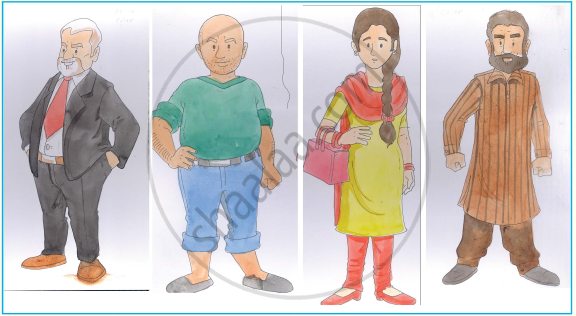Advertisements
Advertisements
प्रश्न
The angel wrote and vanished.
The next night, It came again with a great wakening light,
And show's the names whom love of God had blest,
And Lo! Bin Adhem's name led all the rest.
Read the lines given above and answer the following question.
Mention two other words used by the poet to refer to the angel.
उत्तर
The two other words used by the poet to refer to the angel are ‘the vision’ and ‘the presence’.
APPEARS IN
संबंधित प्रश्न
We notice lots of details about people and their appearance, but in order to
vividly describe them , we need to be specific.
Working in pairs, look carefully at the people around you and complete the
table with appropriate words from the box given on the next page. You may
add words of your own to describe people.

| angular | close-cropped | well-tailored | well-tailored casual | stocky |
| elegant | unshaven | ill-fitting | formal | lanky |
| bearded | sloppy | medium | petite | hefty |
| balding | slim | plaited | thick | round |
| open | friendly | wavy | long | receding |
| over weight | sharp-featured |
| A | B | C | D | |
| Face | ||||
| Hair | ||||
| Dress | ||||
| Build |
It was a summer evening,
Old Kaspar's work was done,
And he before his cottage door
Was sitting in the sun,
And by him sported on the green
His little grandchild Wilhelmine.
She saw her brother Peterkin
Roll something large and round,
Which he beside the rivulet
In playing there had found;
He came to ask what he had found,
That was so large, and smooth, and round.
Read the lines given above and answer the question that follow.
Explain with reference to context.
“I love the West,” said the girl irrelevantly. Her eyes were shining softly. She looked away out the car window. She began to speak truly and simply without the gloss of style and manner: “Mamma and I spent the summer in Deliver. She went home a week ago
because father was slightly ill. I could live and be happy in the West. I think the air here agrees with me. Money isn’t everything. But people always misunderstand things and remain stupid—” “Say, Mr. Marshal,” growled the glum-faced man. “This isn’t quite fair. I’m needing a drink, and haven’t had a smoke all day. Haven’t you talked long enough? Take me in the smoker now, won’t you? I’m half dead for a pipe.”
The bound travellers rose to their feet, Easton with the Same slow smile on his face. “I can’t deny a petition for tobacco,” he said, lightly. “It’s the one friend of the unfortunate. Good-bye, Miss Fairchild. Duty calls, you know.” He held out his hand for a farewell. “It’s too bad you are not going East,” she said, reclothing herself with manner and style. “But you must go on to Leavenworth, I suppose?” “Yes,” said Easton, “I must go on to Leavenworth.”
The two men sidled down the aisle into the smoker. The two passengers in a seat near by had heard most of the conversation. Said one of them: “That marshal’s a good sort of chap. Some of these Western fellows are all right.” “Pretty young to hold an office like that, isn’t he?” asked the other. “Young!” exclaimed the first speaker, “why—Oh! didn’t you catch on? Say—did you ever know an officer to handcuff a prisoner to his right hand?”
Read the extract given below and answer the question that follow.
What does the glum faced man want to do and how does Easton take leave from Miss Fairchild?
Then there it lay in her wet palm, perfect, even pierced ready for use, with the sunset shuffled about inside it like gold—?dust. All her heart went up in flames of joy. After a bit she twisted it into the top of her skirt against her tummy so she would know if it burst through the poor cloth and fell. Then she picked up her fork and sickle and the heavy grass and set off home. Ai! Ai! What a day! Her barefeet smudged out the wriggle— ?mark of snakes in the dust; there was the thin singing of malaria mosquitoes among the trees now; and this track was much used at night by a morose old makna elephant—the Tuskless One; but Sibia was not thinking of any of them. The stars came out: she did not notice. On the way back she met her mother, out of breath, come to look for her, and scolding. “I did not see till I was home, that you were not there. I thought something must have happened to you.” And Sibia, bursting with her story, cried “Something did). I found a blue bead for my necklace, look!”
Read the extract given below and answer the question that follow.
Why did Sibia feel overjoyed?
Mention three things we can learn from the ‘tiny teacher’. Give reasons for choosing these items.
Chandni fought the wolf because she
How was Timothy’s companionship with the puppy?
Do you think the man would ever come back to pick up the watch?
Do you think it is good to be a rebel?
What was the effect on Mr Gessler of the author’s remark about a certain pair of boots?
